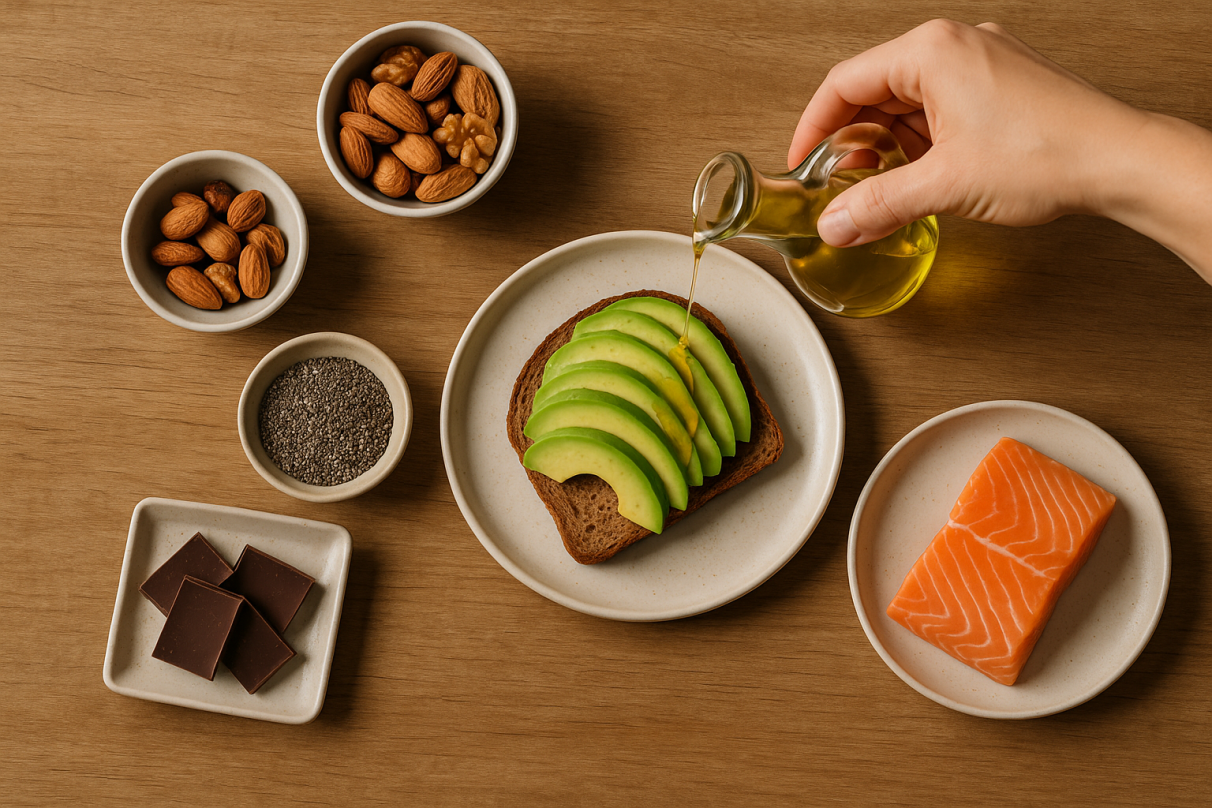Fats: The Endurance and Health Supporter ??

Dietary fat might not directly fuel a short workout, but it’s still crucial for overall health and for longer-duration energy. Fats provide essential fatty acids, help absorb vitamins, and make food taste good (hello, avocado on toast!). They also become a primary energy source during low-intensity or very long exercise sessions when carb stores run low.
Why you need them: Fats support hormone production (for example, the hormones that regulate metabolism and recovery). They also cushion organs and form cell membranes. For women, eating too little fat can disrupt hormonal balance (potentially affecting menstrual cycles). From a sports perspective, having some healthy fat in your diet can keep you satiated and provide lasting energy for endurance activities. Ever wonder how a marathoner keeps going after two hours? As glycogen depletes, the body increases use of fat for fuel. So yes, our body does burn fat – but it needs some carbohydrate flame to ignite that fat fuel, and it needs you to have body fat and dietary fats available.
How much: Fat is the most calorie-dense macro (9 calories per gram, vs 4 for protein or carbs), so you don’t need huge volumes. About 20–35% of your daily calories from fat is a he (Nutrition and athletic performance: What to consider)5†L177-L184】. For a moderately active woman eating ~2000 calories, that’s roughly 45–75 grams of fat a day. It’s relatively easy to hit that since fats are in many foods. The key is choosing the right kind.
Healthy vs. Unhealthy fats: Focus on unsaturated fats, which are heart-healthy and often anti-inflammatory. These come from plant and fish sources. For example:
Monounsaturated fats: olive oil, avocados, nuts (almonds, cashews, peanuts), seeds.
Polyunsaturated fats: fatty fish (salmon, mackerel – rich in omega-3 fatty acids), walnuts, flaxseeds, chia seeds.
Omega-3s (a type of polyunsaturated fat) are especially beneficial for reducing inflammation and could aid recovery. If you don’t eat fish often, consider an omega-3 supplement (like fish oil capsules). Brands like Carlson make popular fish oil supplements that many in Nordic/Baltic countries take for heart and joint health.
Saturated fats: found in animal products (meat, butter, cheese) and some tropical oils (coconut). These aren’t “evil” but should be limited to <10% of your calories. A little cheese or a pat of butter is fine, but lean toward unsaturated fats most of the time. Too much saturated fat can raise cholesterol for some people.
Trans fats: avoid when possible (found in some fried foods and packaged snacks, but thankfully being phased out in many countries).
Role in meals: Including a bit of fat in your meals helps keep you full and provides slow-burning energy. For example, if you only eat a plain bagel (all carb) for breakfast, you might be starving in an hour. But if you add peanut butter to that bagel, the fat/protein combo keeps you satisfied longer. Before a workout, you don’t want to ingest a lot of fat because it digests slowly and can cause sloshing or heaviness. Save higher-fat foods for at least a couple hours pre-exercise or after your workout. Post-workout meals can include some fat, but focus mostly on carbs+protein first for recovery.
Healthy fat examples: Drizzle olive oil on your salad, have a handful of nuts as a snack, add a quarter of an avocado to your sandwich or smoothie (yes, avocado smoothies are a thing!). Enjoy fatty fish like salmon or trout a couple times a week if possible. Even dark chocolate has some healthy fats (along with antioxidants) – just watch out for high sugar content in chocolate if you’re snacking on that.
Fun fact: Despite the fear of fat in the ’90s diet fads, consuming adequate healthy fats can actually help with weight management. They keep you full and can improve your insulin response. So don’t be afraid of that drizzle of olive oil or the almond butter – it might prevent you from raiding the cookie jar later. ?











Comments : 0